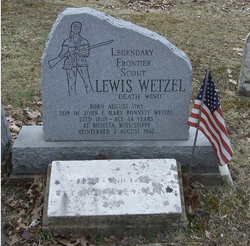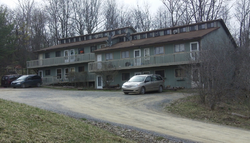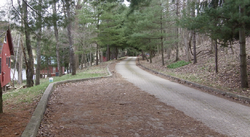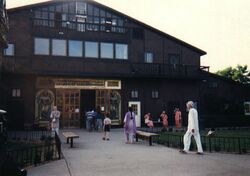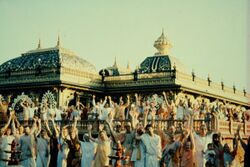Place:New Vrindaban
ISKCON New Vrindaban | |
|---|---|
Unincorporated area | |
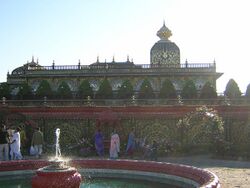 The Palace of Gold | |
| Lua error in Module:Location_map at line 522: Unable to find the specified location map definition: "Module:Location map/data/West Virginia" does not exist. | |
| Coordinates: [ ⚑ ] : 39°57′53″N 80°36′23″W / 39.96472°N 80.60639°W | |
| Country | United States |
| State | West Virginia |
| County | Marshall |
| Area | |
| • Total | 1.9 sq mi (4.8 km2) |
| • Land | 1.8 sq mi (4.7 km2) |
| • Water | 0.04 sq mi (0.1 km2) |
| Elevation | 1,175 ft (358 m) |
| Population (2010) | |
| • Total | 352 |
| • Density | 190/sq mi (73/km2) |
| Time zone | UTC-5 (Eastern (EST)) |
| • Summer (DST) | UTC-4 (EDT) |
| ZIP codes | 26041 |
| Area code(s) | 304/681 |
| GNIS feature ID | 1717344 [1] |
New Vrindaban is an unincorporated area and an ISKCON (Hare Krishna) intentional community located in Marshall County, West Virginia, United States, near Moundsville.[2] The town consists of 1,204 acres (4.87 km2) (of which 0.1 km² is of water),[3] and several building complexes, homes, apartment buildings, and businesses including the Sri Sri Radha Vrindaban Chandra Temple (RVC Temple) and Prabhupada's Palace of Gold. New Vrindaban was founded in 1968 under the direct guidance of A.C. Bhaktivedanta Swami Prabhupada, founder of ISKCON, by his disciple Kirtanananda Swami. It is named for the Indian city of Vrindavan.
Geography
According to the 2010 US Census, the six census blocks that make up New Vrindaban had a population of 352 and had the West Virginia status of unincorporated town. It is bordered on the north and northwest by Big Wheeling Creek, on the East by Stull Run, and on the southwest by the village of Limestone. The town's water and sewage utilities are provided by the New Vrindaban Public Service District, and following the Marshall County Commission's road naming project all streets in New Vrindaban have been fully named. In addition to ISKCON, the town is the location of McCreary Cemetery, resting place of West Virginia pioneer Lewis Wetzel; various locally owned businesses; and other ISKCON-affiliated organizations. The chief components in New Vrindaban's economy are tourism, agriculture, and cottage industries as well as income from fracking on the community's land.[4]
The religious organization ISKCON New Vrindaban is the largest holder of land in New Vrindaban with 38% of the land. The nonprofit organization ECO-Vrindaban, Inc. holds 14%, and all other organizations and individuals own 48% of the land encompassing New Vrindaban. In addition to the previously mentioned organizations, as of 2010 jewellery manufacturer Lone Ones Inc., organic commercial bakery World's Best Cookie, Vaishnava Performing Arts Inc., and Vedic Heritage Trust Inc. had facilities in New Vrindaban.[5]
History
The community was founded in 1968 by Kirtanananda Swami and Hayagriva Das, two early disciples of A. C. Bhaktivedanta Swami Prabhupada.[6] New Vrindaban developed under the guidance of Kirtanananda Swami (honored as "Srila Bhaktipada" after March 1979), and by the mid-1970s the live-in population had grown to over 100.[7] By the 1980s the population was more than 500.[8]
ISKCON New Vrindaban is strictly vegetarian and believes that meat consumption creates negative karma. Alcoholic beverages and illegal substances (such as drugs) are prohibited in the main holy sites around the Temple of Understanding Circle Drive.[9]
According to ISKCON News, on July 4, 1983 Vedavyasa Priya Swami installed the statue of Sri Nathji at the RVC Temple.[10] Conversely, according to Gargarishi Das, the deity was not installed by Vedavyasa Priya, but was installed instead by Kirtanananda Swami.[11]
In October, 1986, a census report showed 377 adults living at the community.[12]
On March 16, 1987, during their annual meeting at Mayapur, India, the ISKCON Governing Body Commission expelled Kirtanananda from the society for "moral and theological deviations."[13] The community of New Vrindaban was expelled from ISKCON a year later.[14] After Kirtanananda Swami left New Vrindaban, and new leadership stabilized, the community was readmitted to ISKCON in 1998.[15][16]
Prabhupada's Palace of Gold
Originally intended in 1972 to be a residence for A. C. Bhaktivedanta Swami Prabhupada, the founder-acharya of the International Society for Krishna Consciousness (ISKCON),[17] the plans evolved after Prabhupada's death in November 1977 for an ornate palace of marble, gold and carved teakwood, which was dedicated as a memorial shrine on September 2, 1979. Kirtanananda Swami, the leader of the New Vrindaban community, and Bhagavatananda das, the community's principal architect and sculptor, were the two primary forces behind its design and construction.[18][19]
It reportedly cost $600,000 in materials, and the labor was donated by the devotees.[17][20] The unpaid workers were often untrained and learned on the job.[21] Kirtanananda Swami explained, "In the beginning, we didn't even know how to lay blocks. As our Krishna consciousness developed, our building skills developed, then our creativity developed, and the scope of the project developed."[22]
Prabhupada's Palace of Gold opened in 1979.[23][24][25] CBS PM Magazine reported, "the magnificence of the Palace of Gold would be hard to exaggerate." Life magazine called the Palace "a place where tourists can come and be amazed."[26] The New York Times proclaimed "Welcome to Heaven."[23] The Washington Post called the palace "Almost Heaven."[24] The Courier-Journal of Louisville stated, "It's hard to believe that Prabhupada's Palace is in West Virginia. In fact, it's hard to believe it's on this planet."[25]
Beginning in the early 1990s, a lack of sufficient financial resources caused palace maintenance to be neglected; nevertheless, as of 2008, 50,000 tourists and Hindu pilgrims reportedly continued to visit each year.[14] Since mid-2011, an ambitious five-year, $4.27-million restoration effort has been underway to restore and renew the palace.[27]
Gallery 1997–2007
Statues of Chaitanya Mahaprabhu and Nityananda (Sri Sri Gaura Nitai) in June 2007.
Statue of A. C. Bhaktivedanta Swami Prabhupada in July 1997.
References
All information is sourced to the following article unless stated otherwise
- Rochford, Burke E. Jr. and Kendra Bailey Almost Heaven: Leadership, Decline and the Transformation of New Vrindaban in Nova Religio: The Journal of Alternative and Emergent Religions Vol. 9 nr. 3 February 2006 (Subscription content?)
Footnotes
- ↑ "Find a County". National Association of Counties. http://www.naco.org/Counties/Pages/FindACounty.aspx.
- ↑ "About us: New Vrindaban" official website. Retrieved 27 March 2009.
- ↑ Marshall County, WV Courthouse, County Assessor Records, Populated Places Statistics
- ↑ Uhle, Amanda (28 May 2023). "He Said I Was a Fracking Heiress. I Went to West Virginia to Find Out.". https://www.politico.com/news/magazine/2023/05/28/fracking-economy-appalachia-00060086.
- ↑ Marshall County, WV Courthouse, County Assessor Records, 2010 Webster District Tax Map 1 and 2 Parcel Data
- ↑ Dasa, Hayagriva (1986). "The Hare Krishna Explosion". Palace Press. http://www.krishnapath.org/eBooks/The-Hare-Krishna-Explosion.pdf.
- ↑ Brugger, Rachael; Cappello, Cydney. "The Rise, Fall, and Rebuilding of New Vrindaban". Ohio University Global Leadership Center. http://www.pluralism.org/affiliates/emery/Rise_Fall_Rebuilding.pdf.
- ↑ Fox, Margalit (24 October 2011). "Swami Bhaktipada, Ex-Hare Krishna Leader, Dies at 74". The New York Times. https://www.nytimes.com/2011/10/25/us/swami-bhaktipada-ex-hare-krishna-leader-dies-at-74.html.
- ↑ Welcome sign at entrance to Temple of Understanding Circle Drive
- ↑ 26 July 2008 Sri Nathji: The Transcendental Cowherd Boy Goes West "Archived copy". http://news.iskcon.com/node/1165/2008-07-26/sri_nathji_transcendental_cowherd_boy_goes_west. ISKCON News, Retrieved on 18 September 2008
- ↑ Gargarishi Das, “Radha-Vrindaban Chandra Festival,” Brijabasi Spirit, vol. X, no. IV (c. August 1983), 17.[verification needed]
- ↑ This is confirmed by the New Vrindaban offering in the 1986 Srila Prabhupada Vyasa-puja book—"Sri Vyasa-puja 1986: The Most Blessed Event, August 28, 1986, The Appearance Day of Our Beloved Spiritual Master His Divine Grace Om Visnupada Paramahamsa Parivrajakacarya Astottara-sata Sri Srimad A.C. Bhaktivedanta Swami Prabhupada, Founder-Acarya of the International Society for Krishna Consciousness"—which listed the names of each resident of the community. Disciples of Srila Prabhupada: 104 men, 66 women; Granddisciples: 99 men, 91 women; Varnasrama College: 17; Children 212. This was probably the year of greatest population for the community.
- ↑ "GBC Resolution 1987 ISKCON - Governing Body Commission". http://vyasapuja.net/iskcongbc/resolutions/gbc/iskcon-gbc-resolution-1987., dead link March 2010
- ↑ 14.0 14.1 Pulliam, Sarah (18 July 2008). "A lower-key kind of Krishna". Columbus Dispatch. p. 1–A. http://www.dispatch.com/content/stories/faith_and_values/2008/07/18/krishna.ART_ART_07-18-08_A1_D6APHC3.html. "Instead of communes, today's Hare Krishnas have embraced congregations and welcome those with only a casual interest in the movement."
- ↑ Houser, Mark (30 April 2006). "Hare Krishnas are rebuilding their temple". The Pittsburgh Tribune-Review. http://triblive.com/x/pittsburghtrib/news/regional/s_448949.html.
- ↑ James R. Lewis (6 April 2011). Violence and New Religious Movements. Oxford University Press, USA. p. 286. ISBN 978-0-19-973563-1. https://books.google.com/books?id=5CqS3ILwnmsC.
- ↑ 17.0 17.1 New Vrindaban Community (1986). Prabhupada's Palace of Gold: A Labor of Love. Palace Press, Moundsville, West Virginia.
- ↑ McCarthy, Ellen (January 2013). "Can Hare Krishnas at Palace of Gold in W.Va. rebuild its tarnished community?". The Washington Post. https://www.washingtonpost.com/lifestyle/magazine/can-hare-krishnas-at-palace-of-gold-in-wva-rebuild-its-tarnished-community/2013/01/04/38dbf6a8-ebc8-11e1-a80b-9f898562d010_story.html.
- ↑ Smullen, Madhava (January 2014). "Restoration Work Underway at Srila Prabhupada's Palace of Gold". https://iskconnews.org/restoration-work-underway-at-srila-prabhupadas-palace-of-gold,4241.
- ↑ Dasa, Yogesvara (July 1981). "In the Hills of West Virginia". http://www.brijabasispirit.com/2014/01/19/prabhupadas-palace-of-gold-back-to-godhead-article-july-1981/. "Prabhupada’s Palace of Gold – Back To Godhead Article – July 1981."
- ↑ "In the process of building the Palace our devotees have become expert in so many arts and crafts; many which we never before thought possible. The labor on the Palace—truly a labor of love—has been done completely by the devotees of New Vrindaban, without any remuneration except for the highest; that is, developing one's spiritual consciousness, knowing that one's efforts are being devoted solely for the pleasure of Krishna and the spiritual master." Damodar Pandit Das, "Scenes from Prabhupada's Palace," Brijabasi Spirit, vol. 4, no. 7 (October 1977), 8.[verification needed]
- ↑ Kirtanananda Swami, cited by Edward Schumacher, "West Virginia Marvels at Indian Palace," The New York Times (Monday, September 3, 1979).[verification needed]
- ↑ 23.0 23.1 Edward Schumacher, "West Virginia Marvels at Indian Palace," The New York Times (Monday, September 3, 1979).
- ↑ 24.0 24.1 Darling, Lynn (1979-09-03). "Krishna Land". The Washington Post: p. D1.
- ↑ 25.0 25.1 "Children of Krishna: Seeking heaven in West Virginia," The Courier-Journal Magazine (Sunday, February 10, 1980).
- ↑ Hillary Johnson, "Children of a Harsh Bliss: In a West Virginia Commune, an Extraordinary Look at Life and Love Among the Krishnas," Life (April 1980).
- ↑ "Palace History". http://www.palaceofgold.com/history.html.
External links
- New Vrindaban Website
- Prabhupada's Palace of Gold Website
- Palace Lodge Accommodations at New Vrindaban
